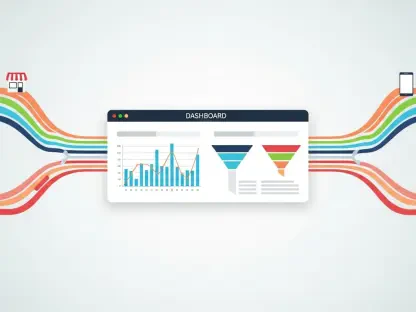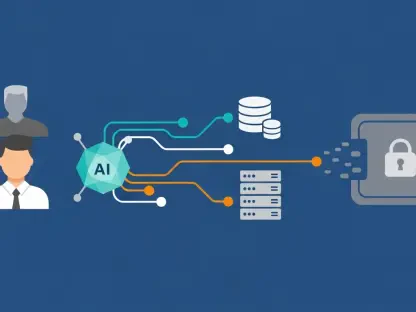In an era where artificial intelligence (AI) is becoming the backbone of business innovation, enterprises face a daunting array of obstacles that can hinder their ability to fully capitalize on this transformative technology, with fragmented data landscapes, stringent security requirements, and the sheer complexity of deploying AI systems often slowing down progress and inflating costs. Cloudera Inc., a trailblazer in big-data solutions, has stepped into this challenging arena with a suite of innovations unveiled at the EVOLVE25 conference, aiming to redefine how organizations approach AI adoption. At the forefront of these advancements is a pioneering solution developed in partnership with Dell Technologies Inc., designed to streamline private AI deployment. Alongside this, enhancements to Cloudera’s data management platform address critical issues of interoperability and efficiency. These developments signal a bold response to the pressing needs of enterprises striving to harness AI while maintaining control over their most valuable asset—data.
Unveiling a New Era of Private AI Solutions
Redefining Deployment with a Unified System
Cloudera’s flagship offering, known as AI-in-a-Box, represents a significant leap forward in simplifying the adoption of private AI for enterprises. Developed through a strategic collaboration with Dell Technologies, this solution integrates Cloudera’s powerful compute engines with Dell’s high-performance, containerized object storage system. The result is a secure, on-premises environment that consolidates both structured and unstructured data into a single, manageable framework. This unified approach directly tackles the pervasive issue of data fragmentation, which often hampers AI initiatives by scattering information across disparate systems. By ensuring that all data resides in one governed location, AI-in-a-Box minimizes security risks and streamlines access, making it particularly appealing to industries with strict compliance demands. The emphasis on an on-premises setup also aligns with growing concerns over data privacy, offering organizations greater control over sensitive information without the vulnerabilities associated with public cloud storage.
Beyond its structural benefits, AI-in-a-Box incorporates a robust suite of tools designed to accelerate every stage of AI development. Features such as the Cloudera AI Workbench enable seamless creation, training, and fine-tuning of AI models, while the Cloudera Inference Service facilitates efficient deployment of these models into production environments. Additionally, the Cloudera Agent Studio supports the development of autonomous AI agents capable of executing tasks independently. This comprehensive toolkit transforms AI-in-a-Box into what Cloudera describes as a “Private AI system,” significantly reducing operational costs by eliminating the need to transfer data across multiple platforms. Industry analysts have noted that such a solution is particularly timely for regulated sectors, where the risks of cloud-based data storage often outweigh the benefits. With predictable pricing and a focus on secure, rapid development, this offering positions Cloudera as a formidable player in the enterprise AI landscape.
Addressing Market Needs with Strategic Alliances
The collaboration behind AI-in-a-Box underscores the power of strategic partnerships in delivering holistic solutions to complex enterprise challenges. By combining Dell’s expertise in infrastructure with Cloudera’s proficiency in data management and AI software, the alliance creates a synergy that benefits both companies and their customers. Dell strengthens its standing as a leading provider of foundational systems, while Cloudera gains access to a broader customer base, enhancing its competitive edge against industry giants and hyperscalers offering sovereign AI solutions. This partnership reflects a wider trend in the tech sector, where complementary strengths are leveraged to build end-to-end systems that reduce deployment risks and simplify adoption for businesses. The result is a low-friction, high-impact offering that caters to organizations seeking reliable and secure AI implementation without the burden of integrating disparate technologies.
Moreover, the economic and operational advantages of AI-in-a-Box cannot be overstated. Cloudera’s leadership has emphasized the solution’s transparent cost structure, which avoids hidden fees and provides predictability for budgeting—a critical factor for large enterprises planning long-term AI investments. This focus on cost efficiency, coupled with the ability to industrialize AI use cases securely, makes the solution a compelling choice for organizations looking to scale their AI initiatives quickly. The collaboration also enhances market reach, allowing Cloudera to tap into Dell’s extensive enterprise network while positioning itself as a trusted provider in the private AI space. As industries increasingly prioritize data control, such alliances are likely to become a cornerstone of innovation, offering tailored solutions that address specific pain points while fostering broader adoption of advanced technologies.
Advancing Data Management for AI Readiness
Seamless Data Sharing with Open Standards
A key component of Cloudera’s recent updates is the Iceberg REST Catalog, an enhancement to its data management platform that champions interoperability across diverse data environments. Built to support Apache Iceberg, an open table format for large analytic datasets, this tool enables secure, zero-copy data sharing across public clouds, private clouds, and on-premises data centers. For enterprises managing distributed data architectures, this capability is a game-changer, as it eliminates the need to move or replicate data between systems—a process that often introduces delays, security vulnerabilities, and additional expenses. Instead, AI systems can access data directly from its original location, ensuring consistent governance and policy enforcement. This approach not only streamlines operations but also aligns with the industry’s growing emphasis on open standards, breaking down silos that have long hindered efficient data utilization in AI workflows.
The significance of the Iceberg REST Catalog extends to its ability to support flexibility without compromising security. Enterprises with complex data setups, where information resides in multiple environments, often struggle to maintain unified control over access and compliance. This tool addresses those challenges by providing a framework for seamless integration, allowing organizations to leverage their existing infrastructure while still benefiting from Cloudera’s advanced AI capabilities. The reduction in operational overhead is another critical advantage, as it minimizes the resources required to manage data movement, freeing up teams to focus on innovation rather than logistics. As the demand for adaptable, secure data solutions continues to rise, such advancements are poised to play a pivotal role in enabling enterprises to build robust AI systems that can operate effectively across varied and evolving technological landscapes.
Automating Efficiency with Intelligent Tools
Complementing the interoperability focus is the Cloudera Lakehouse Optimizer, an AI-powered service designed to automate data management tasks within Iceberg environments. Managing data tables for AI workloads traditionally requires significant manual effort from skilled engineers, involving tasks like rewriting manifests and handling file deletions. The Lakehouse Optimizer transforms this process by intelligently optimizing data tables to enhance performance, delivering query speed improvements of up to 13 times and storage cost reductions of up to 36%, according to Cloudera’s internal benchmarks. This automation not only boosts efficiency but also reduces the dependency on specialized talent, making it easier for organizations to scale their AI operations without incurring prohibitive costs. Such advancements highlight how AI can be applied to solve operational challenges within its own ecosystem, creating a more streamlined path to deployment.
Additionally, the Lakehouse Optimizer offers unparalleled observability and control over data processes, ensuring compatibility with any public or private cloud setup. This adaptability is crucial for enterprises operating in hybrid environments, where data management needs can vary widely based on workload and regulatory requirements. By providing detailed insights into data optimization, the tool empowers organizations to make informed decisions about resource allocation and performance tuning, further enhancing operational efficiency. The focus on minimizing human intervention also addresses a common bottleneck in AI adoption, where the complexity of data maintenance can delay projects and inflate budgets. As enterprises seek scalable solutions that balance performance with cost-effectiveness, tools like the Lakehouse Optimizer are set to become indispensable in building sustainable, high-performing AI systems that can adapt to diverse and dynamic business needs.
Navigating Broader Industry Shifts
Prioritizing Control in AI Deployments
A noticeable trend shaping the enterprise AI landscape is the shift toward private and hybrid models, driven by escalating concerns over data privacy and regulatory compliance. Many organizations, particularly in regulated sectors, are reevaluating their reliance on public cloud environments due to risks associated with data breaches and loss of control over sensitive information. Cloudera’s latest offerings, including AI-in-a-Box, are tailored to meet this demand for localized, secure solutions that prioritize governance without sacrificing functionality. This movement reflects a broader realization that the value of AI is intrinsically tied to the ability to protect and manage the data fueling it. As a result, solutions offering on-premises or hybrid configurations are gaining traction, providing a balance between innovation and the stringent requirements of data stewardship.
This shift also underscores a deeper transformation in how enterprises approach technology adoption. Control over data is increasingly viewed as a strategic asset, as critical as the AI algorithms themselves, prompting a reevaluation of deployment strategies. Cloudera’s alignment with this trend positions it as a leader in catering to industries where compliance is non-negotiable, such as finance and healthcare. The emphasis on private AI systems offers a compelling alternative for businesses wary of external vulnerabilities, enabling them to harness cutting-edge technology within a framework of strict oversight. Looking ahead, this preference for controlled environments is likely to intensify, especially as regulations around data protection continue to evolve, pushing companies to seek partners that can deliver both innovation and assurance in equal measure.
Leveraging Collaborative Ecosystems for Impact
Strategic partnerships are emerging as a linchpin in the quest to deliver comprehensive AI solutions, with Cloudera’s alliance with Dell serving as a prime example of this dynamic. By merging Dell’s infrastructure prowess with Cloudera’s expertise in data and AI software, the collaboration creates a seamless, pre-integrated offering that minimizes deployment complexities for enterprises. Such alliances are critical in an era where customers demand end-to-end solutions that integrate best-in-class components without the burden of manual configuration. This trend of collaborative ecosystems not only reduces risks but also enhances flexibility, allowing businesses to adopt AI technologies at a pace that suits their unique needs while benefiting from the combined strengths of industry leaders.
The impact of such partnerships extends beyond individual solutions, shaping the future trajectory of enterprise AI. They enable companies like Cloudera to expand their market presence and credibility, while providing customers with trusted pathways to navigate the intricacies of AI implementation. The focus on complementary expertise also fosters innovation, as partners can concentrate on their core strengths while relying on each other to address adjacent challenges. As the industry continues to grapple with the dual demands of rapid technological advancement and stringent data governance, these collaborative models are expected to become a standard approach, offering scalable, reliable frameworks that empower enterprises to embrace AI with confidence and clarity.









